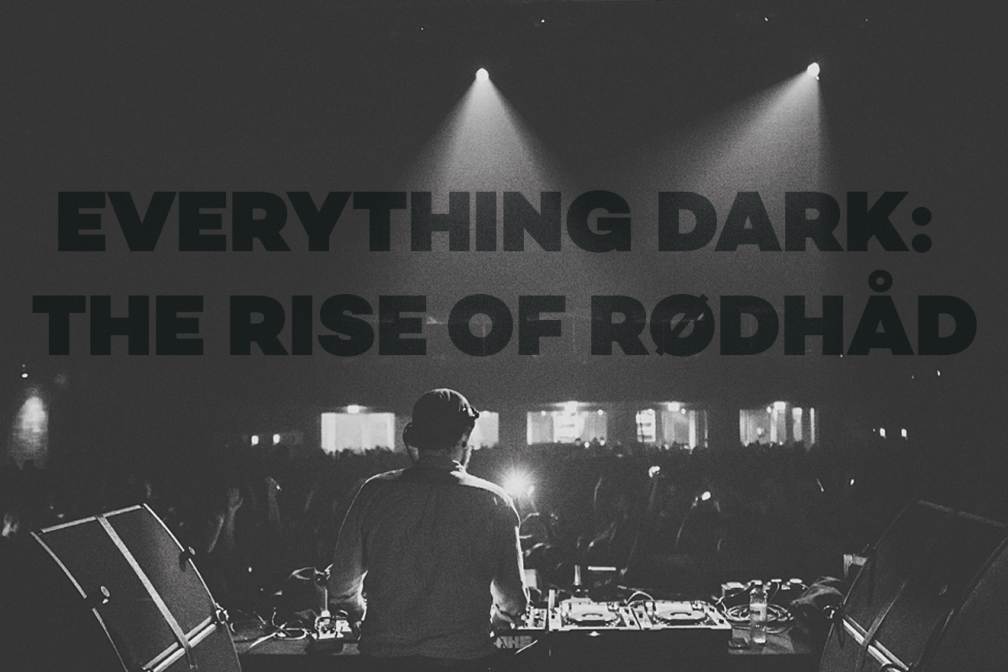 Cover stars
Cover stars
Everything dark: The rise of Rødhåd
Rødhåd’s outsider graft and visions of dystopia have made him one of the leading techno stars on the planet
The macho pyrotechnics accompanying tonight’s show only really begin to flex their muscles towards the end of Rødhåd’s set. An expensive-looking bank of dry ice cannons, fired in sharp unison, startle the 5,000-strong audience. As Rødhåd closes his set to a wild release of cheers, the spectacular lighting rig that illuminates tonight’s Awakenings show in Manchester’s Victoria Warehouse is just beginning to reveal its impressive, showy capabilities. It momentarily lifts the mass of energetic bodies from the dark and brooding soundscape Rødhåd has been building during his relatively short and early slot tonight. But the timing suits Rødhåd, aka Mike Bierbach. Later, when the visuals explode into the epic, Bierbach will have faded from view, leaving many with their favourite musical moments of the night: a superbly crafted build-up, expressed best within the simplicity of the plain walls of this industrial venue.
This energetic but often sparse sound, one that leaves space for freedom of physical movement but regularly rattles the brain with an innate psychedelic edge, is one that Rødhåd carefully nurtures. And it is one that his audience has grown to expect. As comfortable as he is setting the scene in tonight’s warm-up show, these days he’s more regularly to be found playing extensive sessions, such as the following night’s six hour stint at Concrete in Paris, or as the closing act at a major festival. At a time when techno music’s stock is at its highest, Rødhåd has emerged to become one of the leading DJs of its renaissance. He crosses time zones most weekends, taking his meticulously constructed collages to an international audience that wholly appreciates the attention to detail displayed in the curation of his Dystopian sound.
Although Rødhåd has only emerged onto the international stage in the last half-decade, Mike Bierbach’s success as a DJ didn’t happen overnight. It has not been prompted, as so many others have, by studio productions (he was already well established as a DJ in his native Berlin by the time he released his first EP in 2012). Nor has it been propelled by an active social media presence or an affiliation to any of Berlin’s globally renowned label or club brands. If, sitting in his hotel room before tonight’s big event, he shows no sign of nerves, that’s because tonight’s undertaking is a responsibility he knows only too well. Somewhat surprisingly, considering the dark aesthetic his music and his Dystopian label and parties are steeped in, he laughs and jokes his way through an interview which reveals his journey to becoming an internationally recognised talent as the refreshingly old-school tale of an outsider who broke through the ranks by means of talent, determination and vision, and with a little help from his friends.
“Around 2005 I had my first residency in Berlin,” says Bierbach, sipping bottled water, relaxed in the company of two old friends who now operate as his tour manager and label manager. They all speak pretty good English, albeit with heavy German accents, and are casually dressed – though Bierbach is distinctly well groomed, particularly the red hair and beard from whence he takes his DJ name. “It was a small club called Zementgarten. I was playing dub and techno, once every few weeks. Often I would play the opening set and I really liked that. I still like to do an opening set, to set a nice vibe for the night. But it was difficult in Berlin because there were always a couple of groups, crews, doing events and I never really felt like I belonged in any of them.”
Bierbach had grown into playing a slower, spacier, more atmospheric sound by the time of this residency in his early 20s, having grown bored of the relentlessly accelerating, hard techno associated with Berlin – particularly at places like Tresor, which was among his earliest club inspirations. Slowing down from the 145bpm sets he first publicly played as a teen, the dub he refers to is not the Jamaican sub-genre but music by the likes of Maurizio and Basic Channel. He kept the residency for about two years before the club closed and he was left without a home.
We would visit Berghain quite a lot,” he says of that time. “After Berlin lost the Ostgut and the old Tresor it was like the city was waiting for something new, and when Berghain arrived there was a room where techno felt right again. But there was the rumour that you couldn’t play Berghain unless you had a release. That wasn’t 100 per cent correct, but I needed to work on my DJ skills ’til 2010 to get my first chance. The long sets there helped me a lot, and I am really grateful to the club.”


